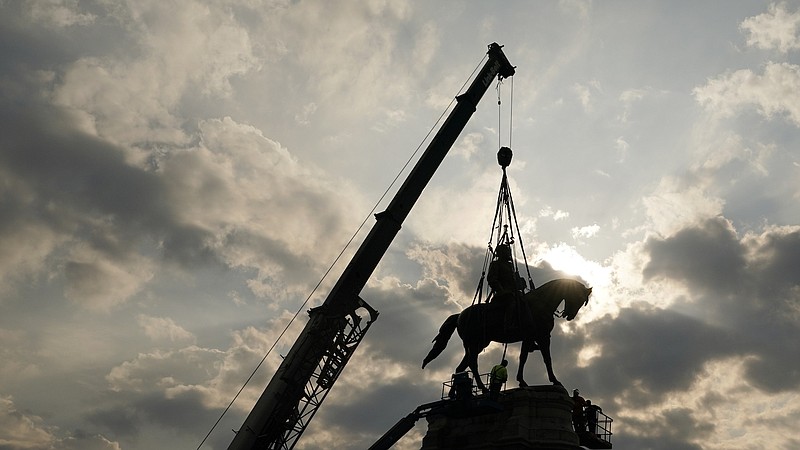Robert E. Lee has retreated from Richmond. Again.
The first time, you will recall, was in April of 1865, when he and his tattered army abandoned the city, fleeing east before finally surrendering at Appomattox Courthouse to federal forces commanded by General Ulysses S. Grant. This latest - and, one hopes, last - retreat was similarly ignoble. A 12-ton, 21-foot tall statue of the Confederate icon was recently lowered by crane from a graffiti-scarred pedestal, cut into two pieces and carted away on a flatbed truck.
Because God's got jokes, the construction company doing the work was Black-owned. A crowd serenaded Lee with that chant Americans reserve for losers: "Na na na na, na na na na, hey, hey, hey, goodbye."
Lee's fall after 131 years is a signal moment in the cultural confrontation sparked by the 2015 church massacre in Charleston and renewed by last year's police murder of George Floyd in Minneapolis. Those events traumatized Americans into a necessary reckoning with a simple question: Why do we raise memorials to the greatest act of treason in American history?
You will find virtually no statues of Benedict Arnold on public land, nor will you ever meet graduates of Benedict Arnold High ("Home of the Fightin' Traitors?"). Yet a 2019 report from the Southern Poverty Law Center counted nearly 1,800 monuments, schools, counties and military bases honoring the Confederacy.
So, last year's protests demanding an end to this celebration of treachery were long overdue, if occasionally overreaching in their ambition. Some activists, for instance, also demanded the removal of statues venerating the likes of Thomas Jefferson. The view from this pew is that the legacy of the third president is badly scarred by, but not restricted to, his ownership of human beings. He did other things, and they are worth honoring. By contrast, the only reason history knows Lee's name is that he betrayed the nation in service to slavery. And in toppling him from a pedestal of honor on a showplace avenue in the former capital of the Confederacy, protesters did a righteous thing.
Not that everyone was thrilled. A retiree who used to work for the federal government issued a statement bemoaning the destruction of "our culture" by the "Radical Left." The Florida man, who once denigrated the heroism of former POW John McCain, praised the loser Lee as a "genius" and a "unifying force."
Which was characteristic of how some of us like to mythologize and make benign America's greatest trauma. They want gallantry and pageantry, not buckets of limbs sawed off without anesthesia or hogs feeding on the entrails of the dead. They want kind and noble Bobby Lee, the reluctant Christian warrior, not Robert E. Lee, the cruel slave master who lacerated brown flesh and ordered it washed with brine. And they want moral equivalence, want those who broke the Union in assertion of the "right" to own people to somehow stand level with those who fought to stop them, as if there were no difference between traitors and patriots.
Consider that Virginia used to celebrate not Martin Luther King Day, but a monstrosity it called Lee-Jackson-King day, pairing King with Lee and Thomas "Stonewall" Jackson, as if a moral ocean did not yawn between a Black civil-rights icon and two slave-holding Confederate generals. America, you see, has always run from the truth of itself. That's what made Lee's last retreat so satisfying.
For once, the truth caught up.
The Miami Herald
